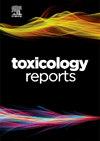Identification and exploration of anticancer activity of novel peptides isolated from the edible bivalve Callista chione in hepatic and colon cancer cell lines
Q1 Environmental Science
引用次数: 0
Abstract
Background
The requirement for relevant and safe drugs for cancer treatment is considered a challenge. Recently, marine isolated compounds with various therapeutic targets have attracted many researchers.
Aim
Isolation and identification of potential anticancer peptides from edible Callista chione soft tissues.
Methodology
C. chione specimens were collected and peptides were extracted, purified with FPLC, and tested on normal (hepatocytes and VERO) and cancer (HepG2, and HT-29) cells. Bioactive fractions were tested by tandem mass spectrometry.
Results
Five different fractions were purified according to ionic charges and two fractions (4 and 5) showed a potent anticancer activity with a total anticancer score threshold of ≥ 0.5, and hydrophilicity mean of 1.75 that related to stability and solubility. The apoptotic and autophagy-related markers were significantly up-regulated in both HepG2 and HT-29 cells treated with IC50 of bioactive peptides’ fractions 4 and 5, explaining their underlying mechanism of action.
Conclusion
Natural source peptides derived from the soft tissue of C. chione could be exploited for the treatment of cancers and a deep in silico study will be performed for further investigation and deep function identification.
从可食用双壳类植物Callista chione中分离的新肽在肝癌和结肠癌细胞系中的抗癌活性鉴定和探索
对癌症治疗的相关和安全药物的需求被认为是一个挑战。近年来,具有多种治疗靶点的海洋分离化合物引起了人们的广泛关注。【目的】可食茉莉软组织中潜在抗癌肽的分离与鉴定。收集chione标本,提取多肽,用FPLC纯化,并在正常(肝细胞和VERO)和癌(HepG2和HT-29)细胞上进行检测。生物活性组分采用串联质谱法测定。结果根据离子电荷纯化得到5个不同的组分,其中2个组分(4和5)表现出较强的抗癌活性,总抗癌评分阈值≥ 0.5,亲水性平均值为1.75,与稳定性和溶解度有关。生物活性肽组分4和5的IC50处理后,HepG2和HT-29细胞的凋亡和自噬相关标志物均显著上调,解释了其潜在的作用机制。结论从牛膝草软组织中提取的天然多肽可用于肿瘤的治疗,为进一步深入研究和功能鉴定奠定了基础。
本文章由计算机程序翻译,如有差异,请以英文原文为准。
求助全文
约1分钟内获得全文
求助全文
来源期刊

Toxicology Reports
Environmental Science-Health, Toxicology and Mutagenesis
CiteScore
7.60
自引率
0.00%
发文量
228
审稿时长
11 weeks
 求助内容:
求助内容: 应助结果提醒方式:
应助结果提醒方式:


